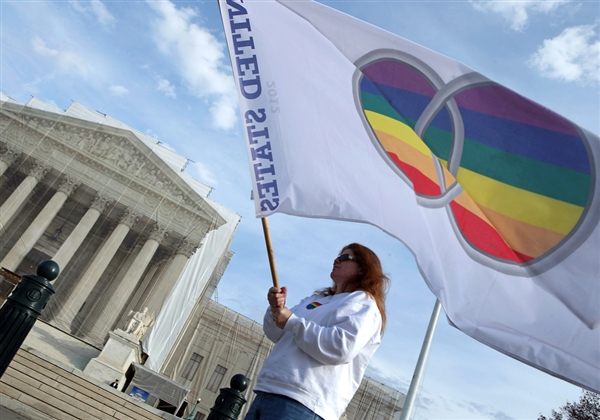by Laura and Rachel
Last Friday, we reported the the Supreme Court declined to take action on any of the ten cases surrounding same-sex marriage that currently sit before them. As Rachel pointed out, these cases aren’t about the whether or not marriage equality is coming soon to a city hall near you. Instead, the Supreme Court makes a decision on each case which, in turn, has larger legal ramifications.
Of the ten cases currently petitioning SCOTUS for a writ of certiorari, eight address DOMA, one challenges Prop 8 and one disputes an Arizona law that restricts health benefits to legally married same-sex couples. Overturning DOMA would legalize same-sex marriage on a federal level but would not require states to perform such marriages. Invalidating California’s Prop 8 or Arizona’s health care law, on the other hand, would legalize same-sex marriage in their respective states and could open the door for more states to following but would have no effect on federal legislation.
The DOMA cases hoping to find their way to the Supreme Court docket are already fairly familiar. Three of the cases are appeals to May’s 1st circuit decision in Boston that found DOMA to be unconstitutional. Four challenge the 2nd circuit’s ruling in favor Edie Windsor. The last deals with the lawsuit that Karen Golinski filed after her employer, the federal government, denied her wife spousal health coverage.
As of today, the Supreme Court has announced that it will in fact take up the issue of same-sex marriage by reviewing BOTH Prop 8 and DOMA. This means that the Supreme Court will consider both the question of whether the federal government is obligated to consider same-sex marriage valid, and whether it’s constitutional to deny same-sex couples the right to marry.









Comments
This update just made my upcoming finals week SO much more tolerable!
…not that they’re related at all, just that now I have so much more hope for the future of my marriage, unlike my future grade in Organic Chemistry…
*gasp!* (speechless)
I’m in love with you, now what?!
C’mon America. Get off the pedestal.
HOLY CATS!
A fuck ton of my rights are going to be decided this year…
…what a time to live in.
That was FAST reporting, AS staff. Kudos.
Yay!
I hope they make the right decisions on these, and rule in favor of equality. The fact that their Obamacare decision indicates some concern for their legacy leads me to believe they will.
I am actually so, so nervous about this. I just have no faith in this court to not screw us over.
Same. My tummy feels all churny just thinking about it.
I agree, the fact that they also took the Prop 8 case terrifies me. A lot.
I’m seriously freaking out this is just going to decide so much. Hopefully the time is right…
just shows how un christian this godless country is smh
Sweetheart, I don’t know if you read the banner at the top of the page or not, but I believe your comment belongs here (www.foxnews.com), not on autostraddle.
well at least he should have had enough time to see the banner while he created the two accounts which ‘liked’ his post
ugh crap I was one of those people, I clicked it on accident, how do I “unlike”?
This is one of those things that matters little, but it will bother me forever if I don’t rectify it…
Yes! Thank God!
Damn it, Uncle Andy! You know being on the computer violates your parole!
DOMA could get overturned around the same time as my college graduation. As in I could enter the real world with real(ish) rights. THIS IS SO CRAZY AWESOME.
I really really really hope that the Supreme Court doesn’t screw us all over.
YEE
THIS IS REALLY GREAT. ALL CAPS GREAT,YKNOW. FOUR FOR YOU,SUPREME COURT.YOU GO,SUPREME COURT.DON’T YOU DARE FUCKING IT UP, SUPREME COURT.
as somebody not from the states my all caps excitement might be a little weird but it’s just that my 12 year old self once wrote in a journal that if she’s getting married it’s gonna be to somebody who speaks english so this is helpful because that little brat always got what she wanted. also equality! :)
Guys I really think they’re gonna make it all happen!
OMG I’m gonna get married!
…Like someday.
I thought this would never happen. Coming from Washington, it was difficult to even understand when my friend announced that we could go ahead and start getting married, I noted, “I thought that we had to wait til December 6th?” He explained to me that it *was* December 6th! It just felt so far away… I’m bewildered as to how far this has come even in my young,young queer life…
They’re slated to announce the results the Thursday of pride weekend in SF. There is no way I’m going to miss out on that party. See you all there?
I thought the same thing when I heard they plan to announce their decision the final week of June. It’s either going to be an epic celebration or a great time to drown our sorrows!
Time to die, DOMA. Time to die
I am excited but also scared because 5 of the 9 judges are conservatives. Maybe Obama would get a chance to appoint a judge before June. I mean Clarence Thomas could have an MI (a little one just enough to bench him) or a scandal that makes him want to “spend more time with his family”. Make it happen universe!
But at the same time, Kennedy identifies as more of a libertarian, and has voted in favor of LGBT rights before. So I think we’ve got a pretty good shot even without a new judge.
Oh, man. We need an accountant IMMEDIATELY.
I need a basket of kittens right now to deal with all the feelings I’m having.